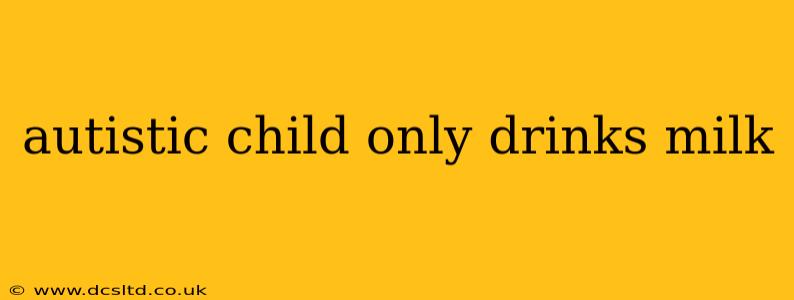Many autistic children exhibit selective eating patterns, and a reliance on milk as a primary beverage—or even sole source of hydration—is a common concern for parents. This isn't simply a matter of picky eating; it can have significant health implications if not addressed appropriately. This comprehensive guide will explore the reasons behind milk-only diets in autistic children, potential health risks, and strategies for encouraging a more diverse and nutritious intake.
Why Do Some Autistic Children Only Drink Milk?
Several factors contribute to an autistic child's preference for milk, often intertwining and creating a complex situation:
-
Sensory Sensitivities: Autistic individuals often have heightened sensory sensitivities. The texture, taste, and smell of other beverages might be overwhelming or unpleasant. Milk's familiar consistency and taste can be comforting and predictable, reducing sensory overload.
-
Oral Motor Difficulties: Some autistic children struggle with the coordination required for drinking from cups or using straws. The ease of drinking milk directly from a bottle or sippy cup can make it a preferred option.
-
Nutritional Deficiencies: While milk provides some essential nutrients, relying solely on it can lead to deficiencies in vitamins, minerals, and other vital components found in a balanced diet. This can become a vicious cycle, with nutritional deficiencies impacting mood, energy levels, and overall well-being, potentially increasing reliance on the readily available comfort of milk.
-
Anxiety and Routine: The familiar and predictable nature of milk can offer comfort and reduce anxiety. Sticking to a routine, even a limited dietary one, provides a sense of control in a world that often feels unpredictable.
What Are the Potential Health Risks?
A diet solely reliant on milk poses serious health risks:
-
Nutritional Deficiencies: A lack of fruits, vegetables, and other foods leads to deficiencies in essential vitamins, minerals, and fiber, increasing the risk of anemia, bone weakness, and compromised immune function.
-
Iron Deficiency Anemia: Milk is a poor source of iron, leading to a significant risk of iron deficiency anemia, which can cause fatigue, weakness, and developmental delays.
-
Obesity or Malnutrition: Ironically, a milk-only diet can lead to both obesity (due to high calorie intake) and malnutrition (due to lack of essential nutrients).
-
Dental Problems: The high sugar content in some milks and the lack of sufficient water intake can contribute to dental cavities and other oral health issues.
-
Dehydration: While milk contains water, it's not a sufficient replacement for plain water, increasing the risk of dehydration.
How Can I Help My Autistic Child Diversify Their Drink Intake?
Introducing new beverages requires patience, understanding, and a gradual approach:
-
Identify Sensory Triggers: Observe which aspects of other drinks your child finds challenging (taste, smell, temperature, texture). This knowledge is crucial for making gradual adjustments.
-
Start Small: Don't force the issue. Offer small amounts of a new beverage alongside milk, allowing your child to choose what they want.
-
Positive Reinforcement: Reward attempts to try new drinks, even if it’s just a small sip. Avoid punishment or negative reinforcement.
-
Experiment with Textures and Temperatures: If texture is an issue, try diluting juices or smoothies to a thinner consistency. Experiment with different temperatures to find what’s most comfortable.
-
Incorporate Fun: Make drinking more enjoyable by using fun cups or straws. Freeze some juice into ice pops for a different sensory experience.
-
Consult Professionals: Seek guidance from a registered dietitian, occupational therapist, and/or speech-language pathologist experienced with autism. They can provide tailored advice and strategies.
Is it Necessary to See a Doctor or Other Specialist?
Yes, it’s crucial to consult with a pediatrician or other healthcare professional if your autistic child is relying solely on milk for hydration and nutrition. They can conduct a thorough assessment, order blood tests to check for nutritional deficiencies, and recommend appropriate interventions.
What About Alternatives to Cow's Milk?
If cow's milk is the preferred beverage but you're concerned about nutritional balance, consider alternatives such as:
-
Fortified Plant-Based Milks: Many plant-based milks (soy, almond, oat) are fortified with vitamins and minerals, offering a wider range of nutrients.
-
Nutritional Supplements: Your healthcare provider might recommend nutritional supplements to address any identified deficiencies.
Remember, patience and a supportive approach are key to helping your autistic child expand their dietary choices. Addressing this issue collaboratively with healthcare professionals will pave the way towards a healthier and more balanced lifestyle.
